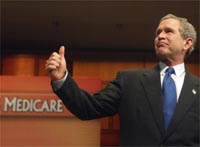
Photo: Associated Press/Wide World Photos
For conservative leaders, the best part of the Medicare bill President Bush signed in December had absolutely nothing to do with Medicare. Rather, the provision that House Speaker Dennis Hastert calls “the most important piece in the bill” and former Speaker Newt Gingrich considers “the single most important change in health care policy in 60 years” is a little-noticed tax rebate set to cost the Treasury $6.4 billion over the next decade. The measure allows Americans to open tax-free “health savings accounts,” which can be used to pay medical bills—in effect removing their owners from the shared risk that has been the core of the health-insurance system since World War II.
Conservatives claim health savings accounts will encourage people to more closely monitor their health care spending and bring down medical costs. Critics call the accounts a tax shelter that will benefit the wealthy and draw young, healthy workers out of health care plans, potentially doubling the cost of insurance for everyone else. But no matter who is right about the long-term impact, there is little doubt about the biggest short-term winner. He is J. Patrick Rooney, a major Republican campaign donor from Indiana who has done more than anyone else to make health savings accounts a reality. Rooney is the chairman emeritus of the Indianapolis-based Golden Rule Insurance Co., which has been selling health savings accounts through a now-expired pilot program that Rooney helped convince Congress to approve in 1996. Just days before the new Medicare bill passed, UnitedHealth Group, the largest insurer in America, paid $500 million in cash for Rooney’s family-owned company—a move that analysts said was directly tied to the Medicare bill’s provisions broadening the market for health savings accounts.
Rarely has a basic federal program been so tied to one man or one company. In their 10-year campaign to promote health savings accounts, Rooney’s family, companies, and employees have given $3.6 million to political candidates and committees, with 90 percent going to Republicans. Rooney and his companies gave another $2.2 million to Republican organizations, including $121,000 to help pay for President Bush’s Florida recount battle, and nearly $1.9 million for a group called the Republican Leadership Coalition, which ran attack ads against Al Gore during the 2000 campaign. Rooney also registered himself as a lobbyist and spent close to $2.2 million working the halls of Congress and the White House.
For conservatives, a key selling point of health savings accounts is the potential effect on the future of health care: In making their case to lawmakers, Rooney’s allies cited polls showing that two-thirds of Americans support government-run, universal health care. By giving a large segment of the population the option to withdraw from the health-insurance system, they argued, health savings accounts could serve as a poison pill preventing another “Hillarycare” debate. “It’s going to be real hard to socialize the system if everybody has their own account,” explains John Goodman, head of the conservative National Center for Policy Analysis.
In the meantime, the Golden Rule division of UnitedHealth has gotten a jump start on the competition, having rolled out new health savings accounts within weeks of the bill’s passage. By then, UnitedHealth’s stock had already jumped 9 percent. “We know this market exceptionally well,” Golden Rule’s top lobbyist, Brian McManus, boasted. “We pioneered it.”











